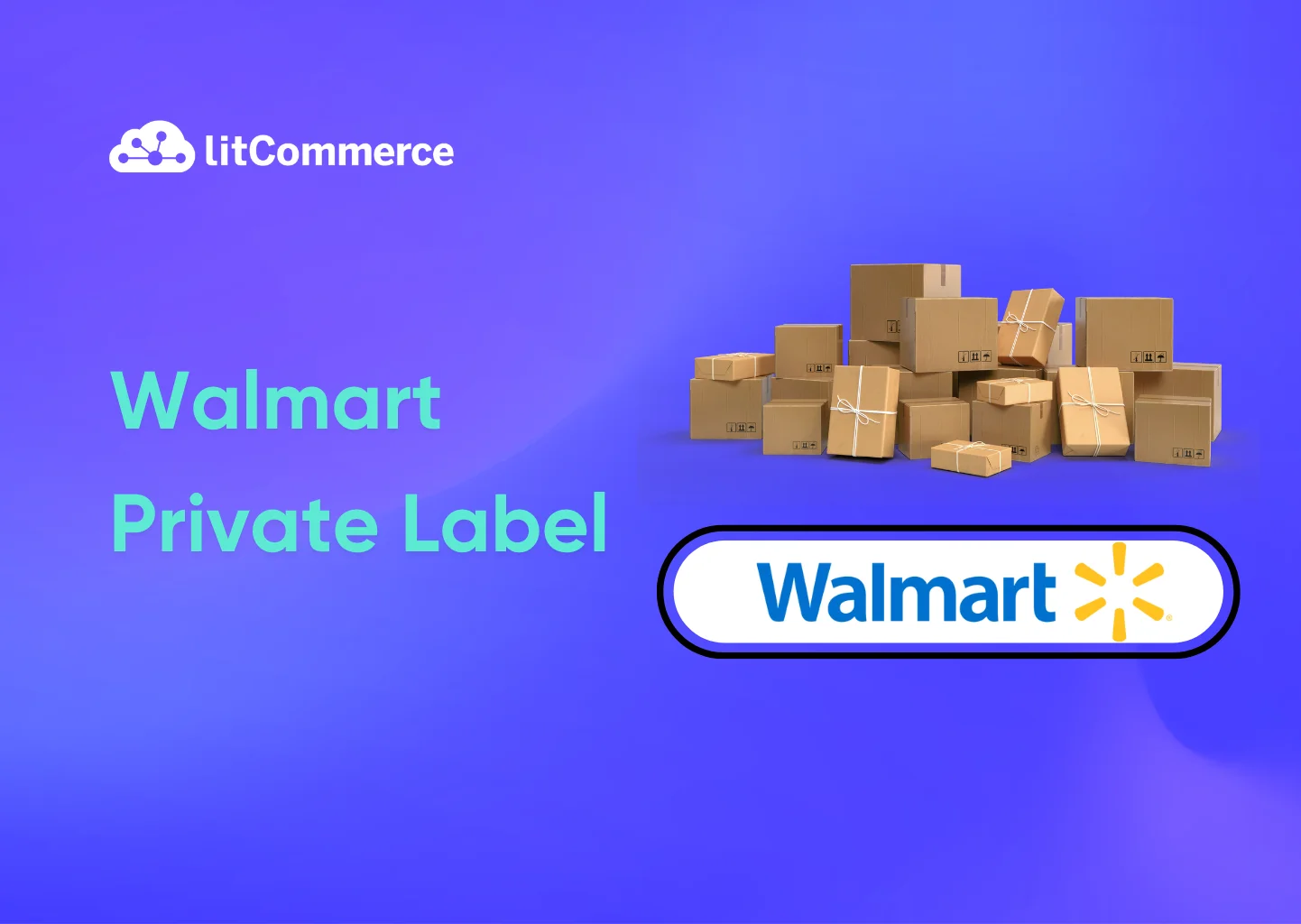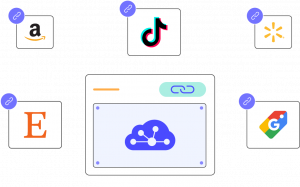Walmart private label brands have quietly become a major force in retail — and this selling channel is leading the charge. They have developed an extensive portfolio of private label brands, offering over 30,000 products across more than 20 categories. From pantry staples to trendy clothing and tech gadgets, Walmart’s in-house brands now offer quality, affordability, and convenience across nearly every aisle.
Whether you’re already selling on Walmart Marketplace or exploring product ideas for your Shopify or Amazon store, this guide will show you how the Walmart private label strategy works — and how you can use the same principles to grow smarter, compete stronger, and sell more in 2026.
Ready to start selling on Walmart
Use LitCommerce’s Walmart integration tool to list, sync, and manage your products with ease — all from one dashboard. Try it now
What is Walmart Private Label Brand?
A Walmart private label is a product manufactured by a third party but branded, marketed, and sold exclusively by Walmart. These include well-known in-house names like Great Value, Equate, and Time and Tru — brands that Walmart fully controls across production, pricing, and placement.
For online sellers, Walmart private label brands matter because:
- They directly compete with third-party sellers in high-volume categories like groceries, home goods, and apparel.
- They showcase how a major retailer uses branding, pricing, and customer data to dominate shelf and search space.
- They provide a playbook for sellers to apply when creating or optimizing their own private label products.
Key features of a Walmart private label brand:
- Retailer-owned branding: Walmart owns the brand, even if a third-party manufacturer makes the product.
- Exclusive to Walmart: You won’t find Walmart private label products at other retailers.
- Customer-centric positioning: Walmart designs each label to speak directly to a specific shopper — value-focused, health-conscious, family-first, and more.
- Pricing power: With tight supply chain control, Walmart can offer lower prices while protecting profit margins.
If you’re a seller in categories like pantry staples, beauty, fashion, or electronics, you’re likely competing with a Walmart private label product. But instead of avoiding the overlap, you can learn how Walmart captures attention and drives loyalty, then use those insights to sharpen your product positioning.
New to selling on Walmart? Check out our guides:
Walmart’s Approach to Private Label Branding
The success of the Walmart private label program is no accident — it’s the result of a smart, data-driven strategy that aligns products with shopper needs while optimizing for profit, brand control, and shelf dominance. For online sellers, this is more than just background info — it’s a roadmap you can learn from and adapt to your own eCommerce business.
Whether you’re launching your own private label or just competing in Walmart’s most active categories, understanding the strategy behind Walmart’s private labels can give you a serious competitive edge.
Walmart’s brand evolution: From generic to growth engine
In the early days, Walmart’s in-house products were basic and often seen as no-frills generics. But in recent years, they’ve rebranded these offerings into distinct, trusted labels — each with its own target customer, product promise, and visual identity.
From Great Value in grocery aisles to Time and Tru in the apparel section, Walmart’s portfolio has evolved into a multi-brand empire, each serving a different demographic. The goal isn’t just to compete on price — it’s to own the buyer’s trust in every major retail category.
Seller tip: Look at how Walmart designs each label to speak to a specific shopper persona — and apply that thinking to your own brand positioning.
Why Walmart invests in private labels
Here’s what fuels Walmart’s private label expansion — and what you can learn from it:
- Higher margins: With no national brand middleman, Walmart earns more per unit sold.
- Customer loyalty: Shoppers return for exclusive brands they trust.
- Product control: Walmart manages quality, packaging, pricing, and shelf space.
- Strategic flexibility: Private labels let Walmart move fast in trending categories — from plant-based food to plus-size fashion.
So, what can sellers learn from Walmart’s strategy?
- Branding matters — even at budget prices: Walmart proves you don’t need luxury pricing to win trust. Clear packaging, reliable performance, and visual consistency go a long way.
- Different brands for different buyers: Walmart doesn’t try to sell everything to everyone with one name. They split offerings into distinct sub-brands — and so can you.
- Use customer data to expand smartly: Walmart leverages massive customer insights to launch in-demand products. As a seller, watch reviews, returns, and search terms to do the same.
List of Walmart Private Label Brands in 2026
Walmart private label brands are massive — and growing. For online sellers, these in-house brands represent both competition and inspiration. By understanding what Walmart offers through its own labels, you can better position your products, pricing, and marketing. Below is a complete breakdown of key private label brands by category, plus what sellers should pay attention to.
1. Food and beverage lines
Walmart’s food brands cover everything from everyday basics to premium, organic-style products. Whether you’re in grocery, snacks, beverages, or supplements, these brands set the pricing and quality expectations for buyers.
1.1 Great Value – Everyday essentials at low prices
This is Walmart’s best-known food brand, dominating the shelf in nearly every category. For sellers, it sets the benchmark for low prices — so competing means finding niches Great Value doesn’t touch or offering unique product bundles.
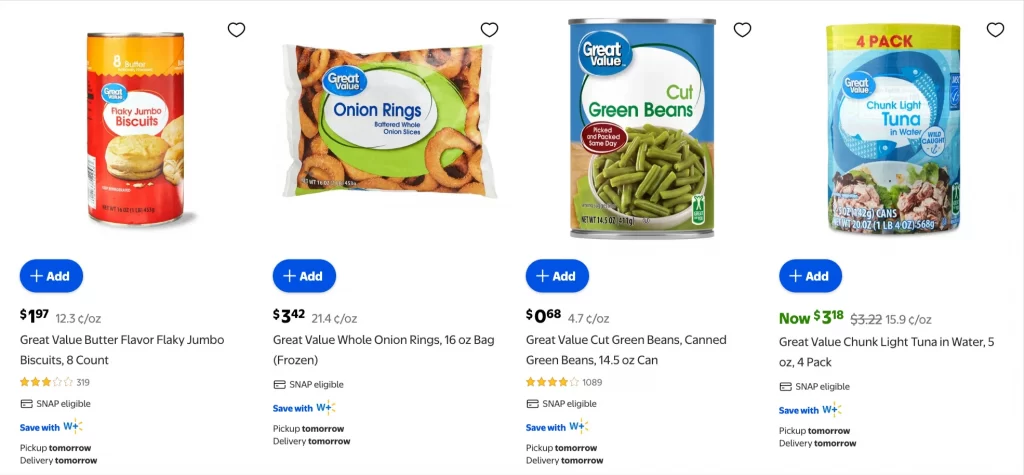
1.2. Walmart Bettergoods – Premium quality with modern appeal
This brand appeals to younger, health-conscious shoppers looking for organic, plant-based, or clean-label options. If you sell premium grocery items, you’ll want to watch how Bettergoods markets health benefits and lifestyle appeal.
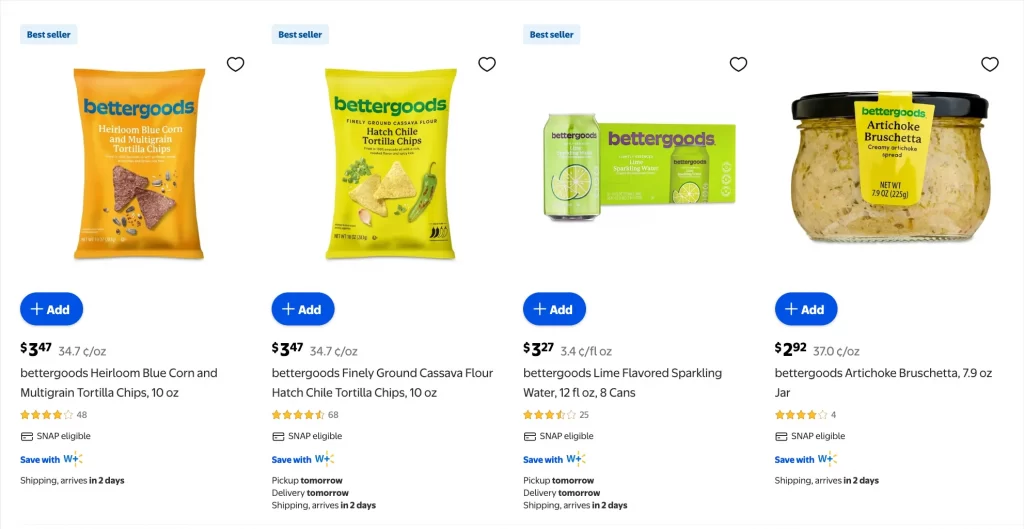
1.3. Marketside – Fresh and ready-to-eat products
Focused on freshness and convenience, Marketside handles deli, bakery, and grab-and-go meals. While it’s mostly in-store, sellers in the meal-prep or gourmet category can take cues from its packaging, seasonal rotations, and ready-to-eat messaging.
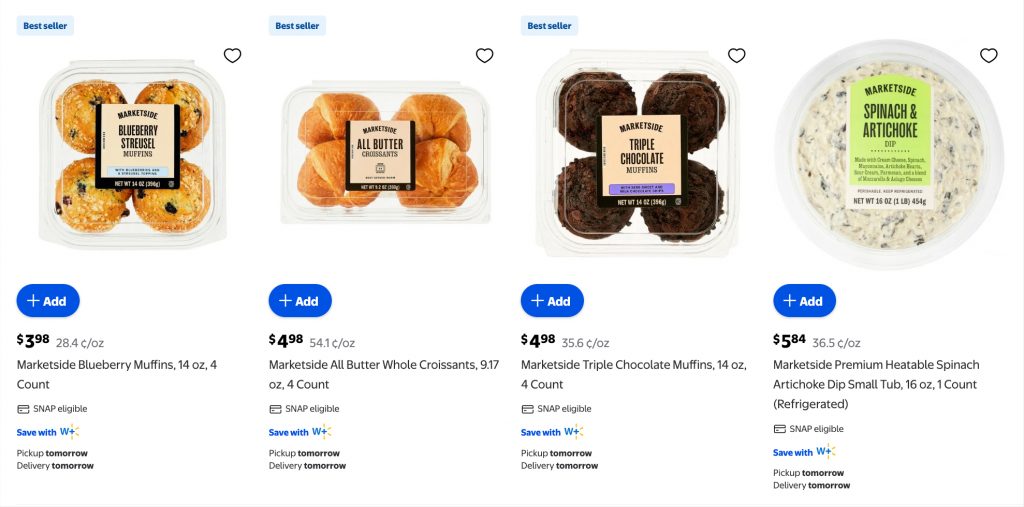
2. Fashion and apparel brands
Walmart private label in the fashion category has become more trend-driven and category-specific. Sellers in the clothing space should study how each brand speaks to a different segment — budget shoppers, plus-size customers, kids, or trendsetters.
2.1. Time and Tru – Trendy, affordable style for women
This line updates quickly to match seasonal and style trends. Sellers targeting female shoppers can study Time and Tru’s product cycles, colors, and pricing for fashion-forward insights.

2.2. Terra & Sky – Plus-size fashion focus
Size inclusivity is a growing market, and Terra & Sky hits it well. Apparel sellers in this space should take note of fit, fabric comfort, and lifestyle branding.
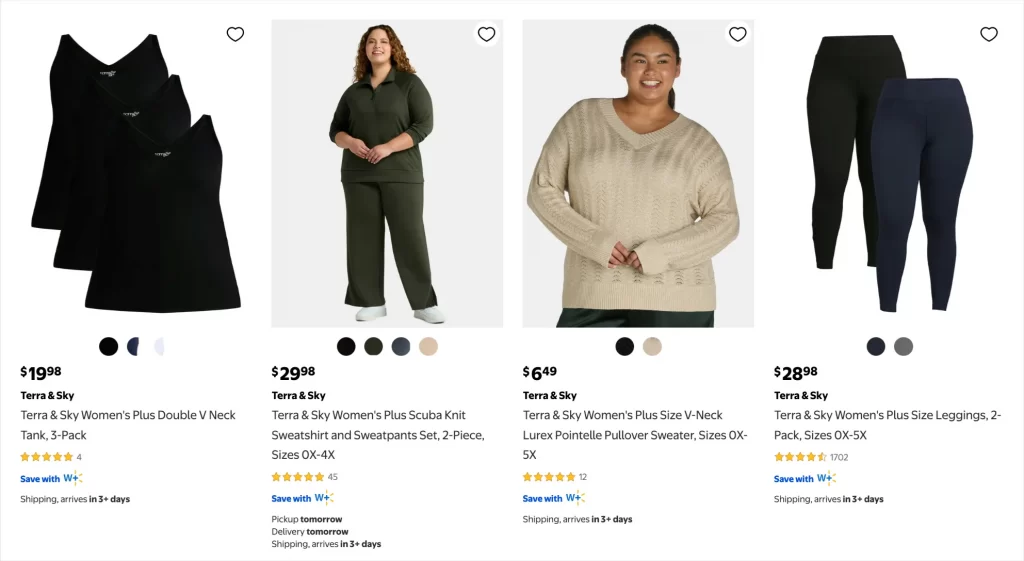
2.3. Wonder Nation – Fun and functional kids’ apparel
This brand combines playful design with practical wear for children. If you sell in kids’ fashion, look at how Wonder Nation balances price, durability, and design appeal to parents.
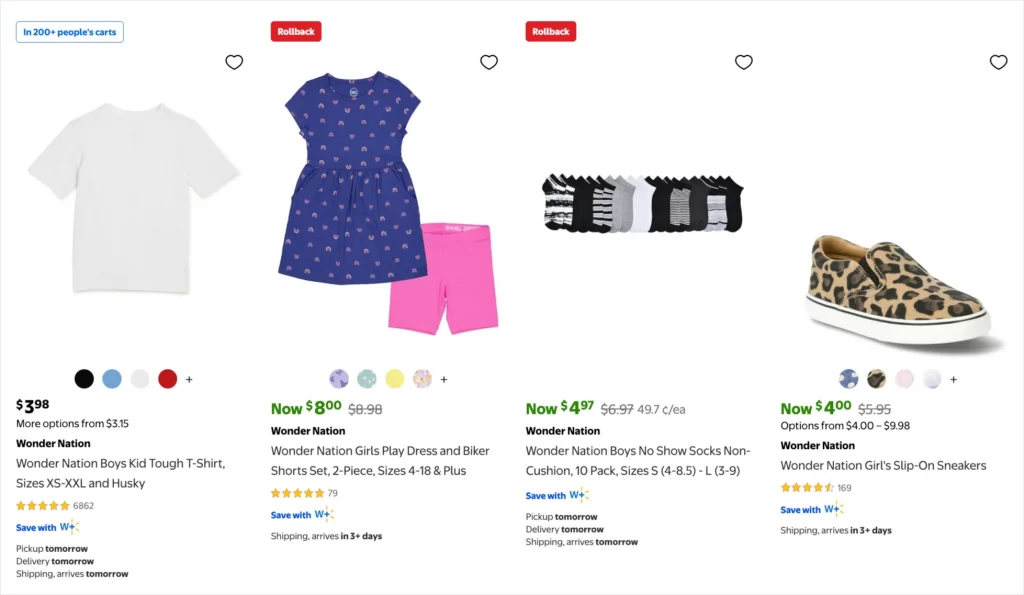
3. Home, furniture, and living essentials
Walmart’s home brands range from bare-bones functionality to lifestyle-focused collections. Sellers in furniture, decor, and storage should be aware of style trends and how Walmart builds trust in private label goods.
3.1. Mainstays – Affordable home basics
A volume-focused line for budget-conscious shoppers. Home product sellers must understand that competing with Mainstays means emphasizing uniqueness, design, or bundled value.
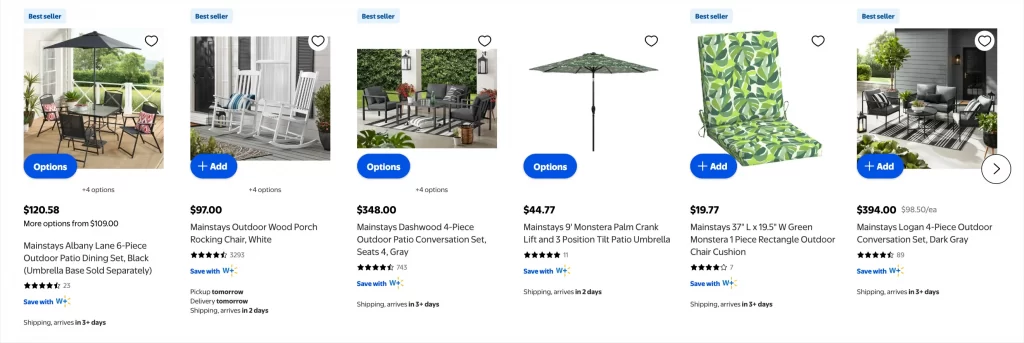
3.2. Better Homes & Gardens – Stylish living at value prices
This licensed line elevates Walmart’s decor game. Sellers in this niche should focus on quality visuals and storytelling — it’s not just about price, but about feeling “at home.”
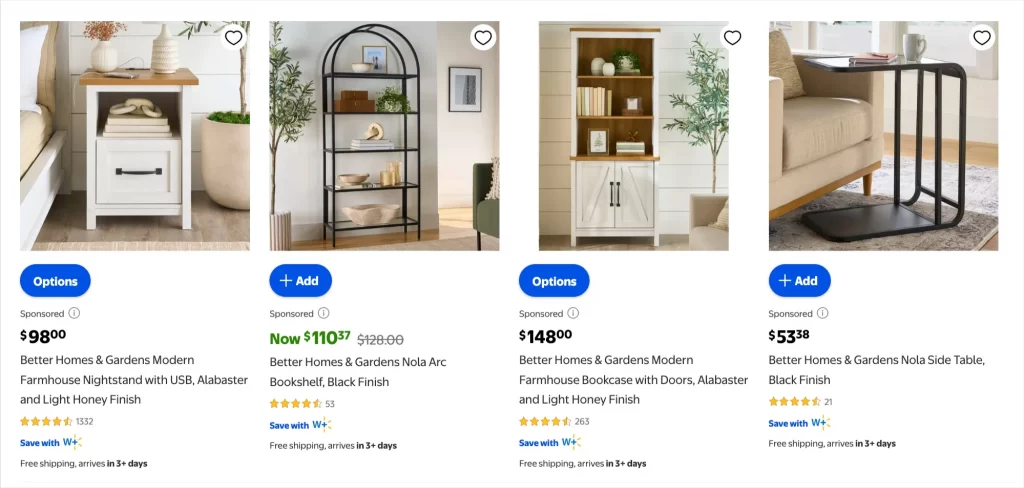
3.3. The Pioneer Woman – Country-inspired kitchen & home
Powered by a strong personal brand, this line shows the value of influencer-based products. Sellers can draw lessons in brand voice, packaging design, and emotional connection with buyers.
4. Health, wellness, and beauty
Walmart has made big moves in health, beauty, and personal care with brands designed to win trust and repeat business. Sellers in these categories must pay attention to price points, label design, and how Walmart positions efficacy.
4.1. Equate – Reliable health & personal care
Walmart’s most comprehensive brand for health essentials. If you’re selling in OTC or personal hygiene, make sure your listings clearly convey added benefits or niche appeal.
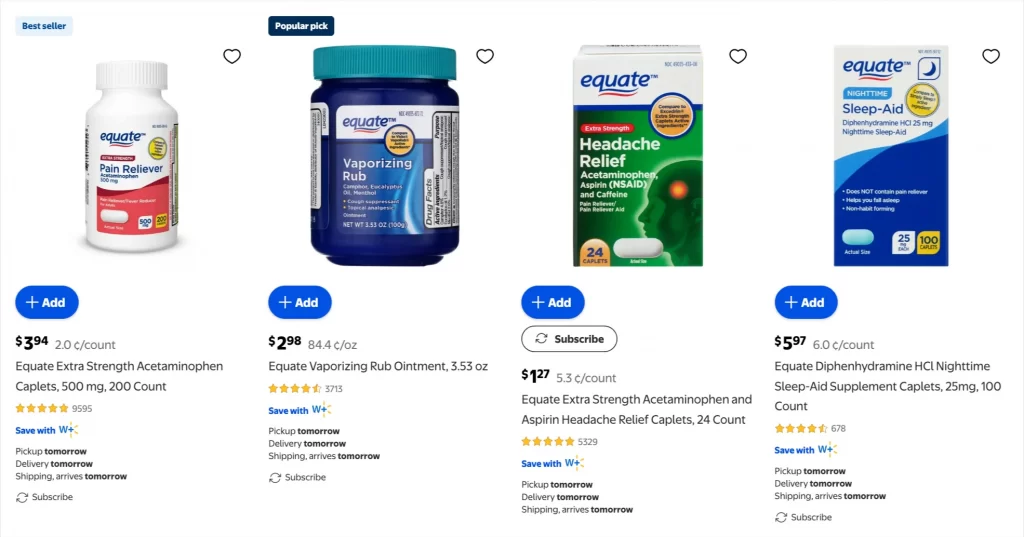
4.1. Spring Valley – Vitamins and supplements
Competing in wellness? Spring Valley dominates with a massive selection and solid branding. To stand out, focus on specialty formulas, clean labels, or subscription-style bundles.
4.2. Simply Basic – Everyday beauty on a budget
This brand handles budget skincare and bath products. Sellers targeting similar categories can compete with natural ingredients, unique scents, or sustainable packaging.
5. Electronics and smart devices
Walmart’s electronics brands are aggressively priced and built to compete with Amazon Basics. Sellers in tech accessories or devices must offer either superior specs, branding, or bundled utility to stay competitive.
5.1. ONN – Low-cost tech and gadgets
ONN focuses on affordability across audio, video, and computing accessories. If you’re in electronics, highlight what ONN doesn’t: premium build, tech specs, or customer support.
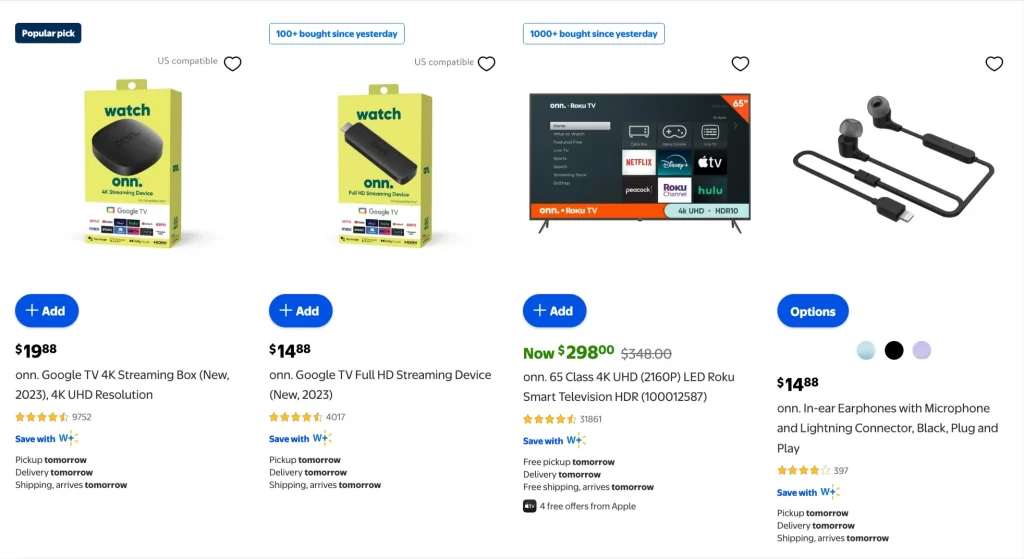
5.2. Blackweb – Mid-tier electronics and accessories (phased out/legacy)
Though mostly retired, Blackweb was a step toward premium tech. Sellers can still reference its branding approach and learn from its mid-range product packaging and presentation.
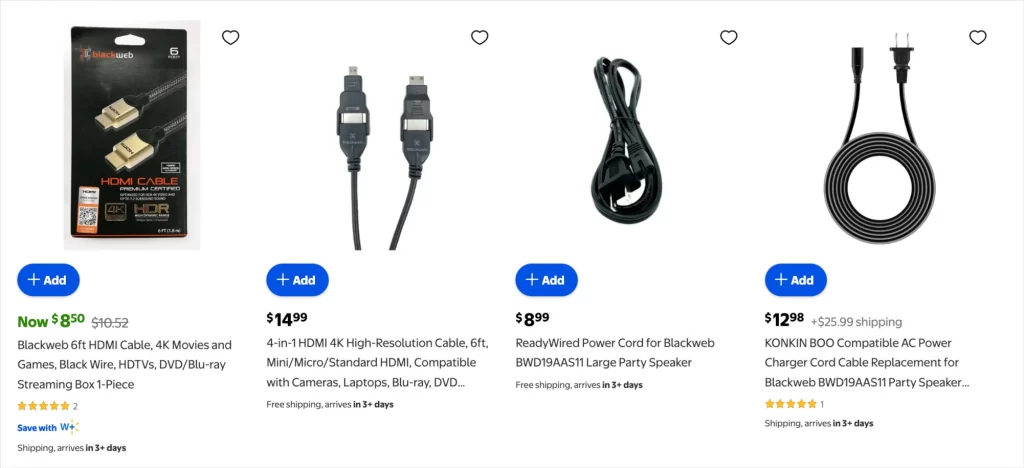
Why Walmart’s Private Label Brands Are Popular
The strength of the Walmart private label strategy lies in its ability to deliver what customers want most: low prices, reliable quality, and wide availability — all wrapped in clear, no-fuss branding. But this success isn’t just relevant to retail giants. For online sellers, it offers a playbook you can learn from and adapt to win in your own niche.
Let’s break down the key reasons why Walmart’s private labels are so popular — and what you, as a seller, can take away.
1. Competitive pricing that builds trust
Walmart’s private label products are almost always priced lower than national brands, sometimes by 20–30%. But they don’t look cheap. Clean packaging, consistent quality, and smart positioning make them feel like a smart choice, not a sacrifice.
Seller takeaway: You don’t need to undercut everyone — you need to show value. Pair a fair price with perceived quality (great images, reviews, clear benefits), and your product becomes the better deal.
2. Consistent availability across channels
Walmart makes sure its private label items are always in stock — whether online, in-store, or on mobile. That availability builds confidence and loyalty with repeat buyers.
Seller takeaway: Stay in stock, especially on high-performing SKUs. Use inventory tools and buffer stock planning to avoid missed sales and buy box losses.
3. Broad product assortment
From vitamins to bed sheets, Great Value, Equate, and Mainstays cover a massive range of categories. This allows Walmart to stay top-of-mind with customers no matter what they’re shopping for.
Seller takeaway: Expand strategically. Offer complementary products or bundles to increase cart size and keep your store relevant across more shopper needs.
4. Clear, functional branding
Walmart doesn’t overcomplicate its private labels. The design is clean, easy to recognize, and consistent across SKUs. This builds familiarity and trust.
Seller takeaway: Invest in visual consistency. Use cohesive colors, fonts, and tone across your product listings, packaging, and storefront — even if you’re a one-product brand.
5. Exclusive access = Customer loyalty
Because Walmart private labels are exclusive, customers have to come back to Walmart to get them — increasing retention. Online sellers can use the same logic by offering exclusive bundles, product variations, or digital add-ons.
Seller takeaway: Give shoppers a reason to buy your version of the product, not just the cheapest one on the page.
How Walmart Private Labels Compare to Competitors
Walmart isn’t the only retail giant building an empire through private labels. Amazon, Target, and Costco have also made major moves with their own exclusive brands. So how does the Walmart private label strategy stack up? More importantly, what can you, as an online seller, learn from these differences to carve out your niche or better position your products?
Let’s compare Walmart to its top competitors and uncover where seller opportunities lie.
1. Walmart vs Amazon Basics
When compared to Amazon Basics, Walmart private labels like ONN and Mainstays serve a similar purpose: offering functional, affordable products in tech and home categories. However, Amazon Basics dominates online convenience and fast shipping through Prime, while Walmart benefits from its hybrid power — combining online sales with in-store shelf space.
For sellers, this means you can carve out space by offering products that go beyond the basics. Focus on better designs, bundles, or added features that neither brand currently emphasizes. Shoppers looking for more than “just functional” will notice your listing.
2. Walmart vs Target’s Up & Up and Good & Gather
Target takes a different approach with its private labels like Up & Up and Good & Gather, focusing heavily on aesthetic appeal and lifestyle-driven branding. These products are beautifully packaged, curated, and often positioned as feel-good choices for quality-conscious shoppers.
In contrast, Walmart still wins in pricing and scale — but it’s starting to evolve with brands like Bettergoods that focus more on clean ingredients and minimalist design. If you’re in beauty, wellness, or grocery, you can stand out by combining Walmart-level affordability with the elevated branding that Target executes so well.
3. Walmart vs Costco’s Kirkland Signature
Costco’s Kirkland Signature brand operates in a different model — one built around bulk buying and perceived premium quality at warehouse prices. While Kirkland appeals to loyal members, Walmart’s private labels offer greater day-to-day convenience and accessibility without requiring a membership.
For sellers, this is a chance to offer flexible options — such as small packs for first-time buyers and larger bundles for loyal, repeat customers. By mirroring the “value” of Kirkland and the accessibility of Walmart, you can attract both deal hunters and convenience-first shoppers.
What Walmart’s Private Label Success Can Teach You
Walmart’s private labels are more than just budget alternatives — they’re a masterclass in retail strategy. From pricing and product selection to branding and inventory flow, every move is intentional. As an online seller, there’s a lot to learn from how Walmart builds, positions, and grows its in-house brands. Here are seven key lessons to take away.
1. Strategic price positioning without sacrificing quality
Walmart strikes a balance between affordability and trust. Its private labels are low-cost but still meet quality expectations. Sellers can apply the same principle: offer products that feel “worth it” — even when they’re budget-friendly.
Tip: Invest in better packaging, clear product descriptions, and customer support — especially if you’re competing on price.
2. Data-driven category selection
Walmart uses data to decide which categories need private label options. It focuses on high-volume or under-served niches. Sellers should do the same — use keyword research, sales trends, and competitor gaps to guide product decisions.
Tip: Don’t just follow trends — find underserved sub-niches where you can dominate.
3. Visual consistency and brand recognition
From Great Value to Time and Tru, Walmart private labels have a consistent, recognizable look. This builds trust. Online sellers should create a cohesive visual identity — across logos, packaging, product photos, and storefronts.
Tip: Use tools like Canva or AI design tools to ensure all your visuals reflect your brand voice.
4. Inventory forecasting and product availability
Walmart keeps shelves stocked. Its supply chain is tightly managed to prevent out-of-stocks — especially for fast-moving private labels. Sellers can follow suit by planning for seasonal demand and using inventory management tools.
Tip: Use low-stock alerts, reorder points, and sales data to avoid missed sales opportunities.
5. Cross-platform integration and consistency
Walmart private label products look and feel the same — whether in-store, on Walmart.com, or in the mobile app. Sellers should aim for that same consistency across platforms like Amazon, Shopify, and Walmart Marketplace.
Tip: Sync titles, descriptions, and branding across all your listings to build a unified experience.
6. Leveraging first-party data for merchandising
Walmart uses shopper data to improve product placement, messaging, and development. Sellers should track reviews, return reasons, and customer behavior to optimize listings and product choices.
Tip: Use customer Q&A and feedback to improve your product pages and guide future sourcing.
7. Optimizing for Walmart’s (and other) search algorithms
Walmart private labels are more than just budget alternatives — they’re a masterclass in retail strategy. From pricing and product selection to branding and inventory flow, every move is intentional. As an online seller, there’s a lot to learn from how Walmart builds, positions, and grows its in-house brands. Here are seven key lessons to take away.
Walmart’s Private Label – Frequently Asked Questions
Walmart’s private label brands are products made by third-party manufacturers but sold under Walmart-owned brand names like Great Value, Equate, or Time and Tru. These are exclusive to Walmart stores and its online platforms. Walmart typically partners with contract manufacturers — many of which also produce for well-known national brands. These manufacturers produce the items under Walmart’s specifications, branding, and quality standards. Private labels help Walmart improve profit margins, build brand loyalty, and offer exclusive value. Since Walmart controls production, branding, and distribution, it can offer competitive prices and drive higher in-store and online conversions. Focus on what Walmart doesn’t do well: Niche markets or specialty products Personal branding and storytelling Premium or artisanal features Better customer support or education Pro move: Offer bundles, subscription options, or unique add-ons that Walmart’s standardized products don’t include.
Walmart Private Label – Final Thoughts
Walmart private label success isn’t just about cheaper alternatives — it’s about knowing their customers, owning their brand voice, and leveraging data at every step. As an online seller, whether you’re competing with Walmart or learning from them, one thing is clear: private labels are here to stay — and growing fast.
The real takeaway? You don’t need to be a retail giant to apply the same principles. From smart pricing and strategic product selection to consistent branding and customer-focused listings, you can build your own brand that shoppers trust and remember.
So whether you’re launching your first private label or optimizing an existing one, use Walmart’s playbook as inspiration — then make it your own.
If you want to get your products in front of more shoppers across top sales channels? Try LitCommerce Product Feed to sync, optimize, and automate your listings effortlessly!

